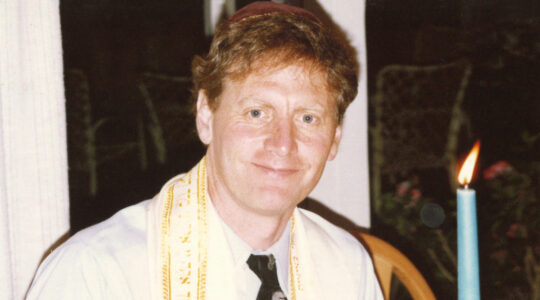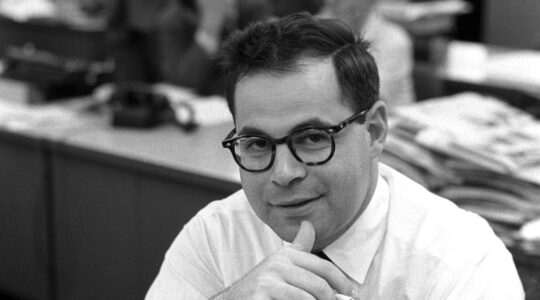WASHINGTON (JTA) — Robert Wolfe, the irreplaceable former chief archivist for captured Nazi documents at the National Archives here, died Dec. 10 at the age of 93. With his death, a legacy also dies.
Wolfe singlehandedly galvanized a generation of Holocaust and Nazi-era historians and authors — including me.
He was assigned to the Nuremberg War Crimes prosecutor’s office, where he became familiar not only with the infamous testimony now published in many volumes of the Nuremberg Trials, but also the many thousands of linear feet of evidentiary documents still largely unexploited. These are millions of pages of letters, memos, reports and other documents that construct the enormous case of genocide brought against the Hitler regime.
Later, Wolfe helped in microfilming the voluminous cache and creating the archives both at the Berlin Documentation Center in Germany and the National Archives in Washington.
A generation of thirsty historians made pilgrimages to Wolfe’s jail cell-like offices at the archives. Each austere room had a locked cage door with attached sign-in and sign-out sheets.
Often the historian would just enunciate his topic. Wolfe then would reach into his user guides and the recesses of personal memory, fetching 10 or 20 linear feet of files. The historian’s relentless folder-by-folder search would ensue. As nuggets were uncovered, the focus sharpened and conclusions honed. Wolfe would provide mid-course corrections along the way.
Many award-winning Holocaust historians began this way and went on to produce major published works. Many achieved a measure of recognition and success. But Wolfe’s name was often relegated to a mere mention in a long “thank you” list in a book’s acknowledgements.
In my case, at least two projects were revelations to both of us.
I first came to Wolfe in the early 1980s. Together we explored the undiscovered workings of a complex economic arrangement between Nazi finance authorities and the Zionist organization to rescue Jews by transferring them and their assets to Jewish Palestine. This was the Haavara (Transfer) Agreement, which led to my first book, “The Transfer Agreement.”
It was Wolfe who taught me lonely courage, tough scruples and indefatigable diligence in archival and historical endeavor. He helped me every step of the way on that first book, validated my findings, reassured me and pushed me through history’s door.
He and I worked together on many other projects through the years, but most salient was my discovery that IBM had consciously helped plan and organize Hitler’s Holocaust using the company’s customized punch cards. Wolfe had just retired from the National Archives when I embarked upon that project. He agreed to help me find the documentary proof and traveled with me through Germany as we visited archive after archive.
Because Wolfe was known everywhere as an eminent archivist and the principal custodian of the Nazi papers, we received special and expedited access to the many private and public repositories scattered across Germany.
One day, we had stealthily arranged to visit an unknown IBM archive devoted to punch cards that was quietly maintained in a company facility near Stuttgart. The files were unique, composed of technical advisories to Nazi agencies, outlining how to achieve, step by step, Hitler’s tasks of systematically persecuting and destroying the Jews.
Our appointment was set, but at the last minute IBM headquarters in New York learned of our mission. When we showed up at the appointed time, we were informed through the surreal medium of a security intercom that the archive had been suddenly “shut down.” We could not even come inside.
Chilly rain drizzled down our cheeks as Wolfe summoned an intense inner anger born of decades of devotion to documenting Nazi history. He bellowed, “In the name of history, open this door!” Each of us said it again and again. IBM would not.
No matter; Wolfe and I persevered. Ultimately the information indicting IBM was assembled, verified, cross-checked, vetted and revealed to the world in meticulous detail. That would not have been possible without Wolfe’s unique expertise and help.
Other authors have their own stories.
The eminent historian Shlomo Aronson offered this memory: “Bob was not only a mentor, but our dear colleague … You could always trust him to guide you and save you from misinterpretation of the records … We historians will cherish his memory.”
I have lost a friend. The National Archives has lost a resource. History has lost a valiant soldier.
(Edwin Black is the author of 11 award-winning books, including “The Transfer Agreement,” “IBM and the Holocaust” and his most recent book, “Financing the Flames.”)
JTA has documented Jewish history in real-time for over a century. Keep our journalism strong by joining us in supporting independent, award-winning reporting.






